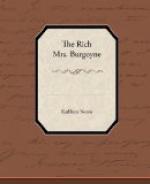“Everyone thinks so,” he answered with a quick rush of words that showed how great the relief of speech was. “Even up in Hetty’s home town, Plumas, they think so. I wrote home that Hetty had left me, and they drew their own conclusions. It was natural enough; she was never strong. She was always restless and unhappy, wanted to go on the stage. She did go on the stage, you know; her mother advised it, and she—just left me. We were in New York, then; Bill was a little shaver; I was having a hard time with a new job. It was an awful time! After a few months I brought Bill back here—he wasn’t very well—and then I found that everyone thought Hetty was dead. Then her mother wrote me, and said that Hetty had taken a stage-name, and begged me to let people go on thinking she was dead, and, more for the kid’s sake than Hetty’s, I let things stand. But Hetty’s in California now; she and her mother live in San Francisco; she is still studying singing, I believe. She gets the rent from two flats I have there. But she never writes. And that,” he finished grimly, “is the last chapter of my history.”
Sidney still stood close to him, earnest, fragrant, lovely, in her white gown. And even above the troubled tumult of his thoughts Barry had time to think how honest, how unaffected she was, to stand so, making no attempt to disguise the confusion in her own mind. For a long time there was no sound but the vague stir of the night about them, the faint breath of some wandering breeze, the rustling flight of some small animal in the dark, the far-hushed, village sounds.
“Thank you, Barry,” Sidney said at length. “I’m sorry. I am glad you told me. Good-night.”
“Good-night,” he said almost inaudibly. He ran down the steps and plunged into the dark avenue without a backward look. Sidney turned slowly, and slowly entered the dimly lighted hall, and shut the door.
CHAPTER XI
“Come down here—we’re down by the river!” called Mrs. Burgoyne, from the shade of the river bank, where she and Mrs. Lloyd were busy with their sewing. “The American History section is entertaining the club.”
“You look studious!” laughed Mrs. Brown, coming across the grass, to put the Brown baby upon his own sturdy legs from her tired arms, and sink into a deep lawn chair. The June afternoon was warm, but it was delightfully cool by the water. “Is that the club?” she asked, waving toward the group of children who were wading and splashing in the shallows of the loitering river.
“That’s the American History Club,” responded Mrs. Burgoyne, as she flung her sewing aside and snatched the baby. “Paul,” said she, kissing his warm, moist neck, “do you truly love me a little bit?”
“Boy ge’ down,” said Paul, struggling violently.
“Yes, you shall, darling. But listen, do you want to hear the tick-tock? Oh, Paul, sit still just one minute!”




